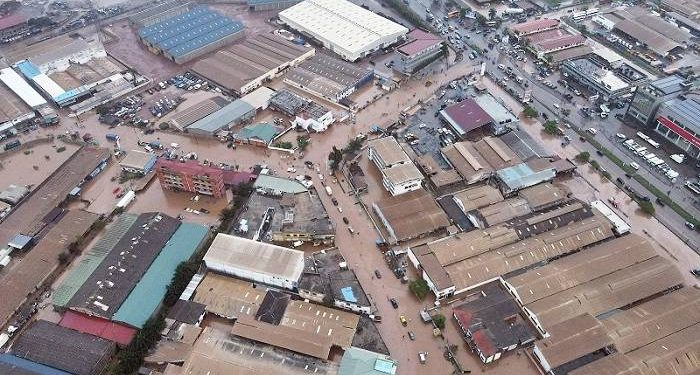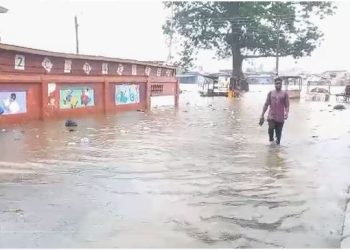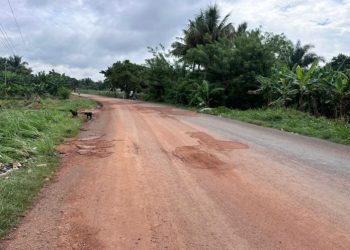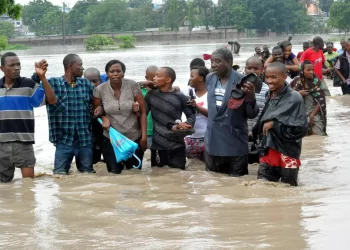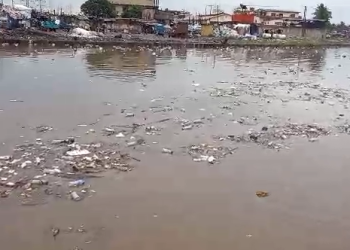At least, 150 people lost their lives while scores sustained injuries of varying degrees almost eight years ago on June 3, 2015, following a downpour that was met with a fuel station explosion at Circle, Accra.
That “Black Wednesday” took the precious lives of people who were taking shelter from the downpour at the Goil fuel station that night and destroyed to varying degrees about five buildings, including the station. These properties, according to the report on the disaster, were valued at GH₵1.6 million then.
This day has not been forgotten as it threw the entire country into a state of mourning and took a long time to get over it. Even now, some of the direct victims and indirect ones like families are still counting their loss.
Data from the National Disaster Management Organisation (NADMO) have also revealed that at least 174 people died in the country during floods that occurred between 2014 and 2020.
The number which comprised 118 males and 56 females were part of 604,475 people who were affected by the floods within the seven-year period.
The data also showed that five people were missing in those floods while 172 others sustained injuries of varying degrees.
Irrespective of the attendant consequences of floods over the years in the country, no interventions have been able to address the menace.
Eight years after the flood cum fire disaster (the June 3 twin incident), flooding has worsened due to the increasing impact of climate change.
Two months ago, on March 7, two siblings aged 11 and nine reportedly died at New Bortianor Baba Dogo, near Accra, after a downpour.
According to their mother, Sister Ama, the rain carried her and her three children away when the rain collapsed part of the single room they lived in until she and one of her children were rescued.
Another person was also reported dead after being electrocuted by power cables in floodwater in a house at Mallam, Accra.
Over the years, what has been attributed to some major causes of these disasters have been uncontrolled human settlements, poor planning of urban areas, poor drainage systems, improper waste disposal, choked drains, and lack of enforcement of laws on building and littering.
What we turn to lose sight of is the fact that climate change has a hand in all of this flooding.
Climate change is doing more harm than good. The way water moves around the planet is being affected by climate change as more wet areas are getting wetter while dry ones are getting drier. Rains are also experienced in intense forms, which subsequently result in floods.
Also, decreased mental well-being can be associated with the impacts of climate change, which has over the years aggravated flooding and bushfires.
What is Climate Change?
The United Nations (UN) refers to climate change as the long-term shifts in temperatures and weather patterns. Although these shifts may be natural, human activities such as burning fossil fuels like coal, oil and gas have immensely contributed to these shifts.
According to Action Aid, an international non-governmental organisation (NGO), climate change has increased the frequency and intensity of floods and other natural weather-related events seen globally.
Research and science have found that the air holds up seven per cent more water vapour for every degree Celsius rise in temperature. The water vapour turns into droplets that fall as rain after the air speedily cools. The rainfall then causes floods or overflow dams and rivers, causing spillage and subsequently displacing people and affecting food production.
What are floods?
Floods are overflows of water on dry land. Action Aid defines it as a sudden onset event where normally dry land is submerged in accumulated water such that it is unable to absorb.
According to Action Aid, the degradation of soils and the ecosystem due to unsustainable development makes it increasingly difficult for lands to absorb the waters from heavy rains. Coupled with little or poor flood planning and management, floods are exercabated.
The Natural Resources Defence Council (NRDC) states that there are weather events (heavy or prolonged rains, storm surge, sudden snowmelt), and then there are the human-driven elements, including how we manage our waterways (via dams, levees, and reservoirs) and the alterations we make to land.
Increased urbanisation, for example, among other things, alters natural drainage systems and often leads to more homes being built on floodplains. In cities, under-maintained infrastructure can lead to urban flooding. More and more flooding factors are also linked to climate change.
The Intergovernmental Panel on Climate Change (IPCC) says that climate change “has detectably influenced” several of the water-related variables that contribute to floods, such as rainfall and snowmelt.
Some major types of floods include flash floods caused by heavy rains; river floods that are seasonal and coastal floods associated with cyclones and tsunamis. Another type is urban flooding which occurs when rainfall overwhelms drains of a densely-populated area. This happens when rainfall runoff is channelled from roads, parking lots, buildings, and other impervious surfaces to storm drains and sewers that cannot handle the volume.
Ways Climate Change Increases Flood Risks
Heavier Precipitation
A warmer atmosphere holds and subsequently dumps more water. In addition, because of global warming, when it rains, it pours more. Such was the finding of a study by the National Oceanic and Atmospheric Administration (NOAA) examining the record-breaking rainfall that landed in Louisiana in 2016, causing devastating flooding. The study determined that these rains were at least 40 per cent more likely and 10 per cent more intense because of climate change.
Of course, heavier rainfall does not automatically lead to floods, but it increases the potential for them. Moreover, even moderate amounts of rainfall can cause serious damage, particularly in places where urban flooding is on the rise.
Higher Sea Levels
This increases storm surges and the risk of high tide flooding.
Increased Frequency of Strong Storms
Over the years, climate change has contributed to the increased rate of storms that subsequently results in rainfall, which then causes floods.
Ghana’s Susceptibility/Consequences of Floods
The World Bank states that flooding affects about 45,000 Ghanaians every year and half of the country’s coastline is vulnerable to erosion and flooding as a result of sea-level rise.
Flood disasters have largely become normal in the country, particularly the capital Accra, and these floods not only inundate homes but farms, pastures and livestock. These floods destroy lives and properties, disrupt socio-economic activities, and decrease food availability and stability.
Again, floodwaters can carry sewage, toxic chemicals and hazardous waste materials anywhere, including homes, leading to contamination and diseases. That is because these waters can pollute drinking water supplies and cause infections. Flooding can also lead to mental health problems that result from the loss of businesses or wages. It can cause big financial losses to people and the state.
Further, while it is true that floods do not discriminate, affecting anyone in their path regardless of wealth or ethnicity, it is most often lower-income people, the elderly, and minority communities who suffer the greatest impacts. These populations are least likely to have flood insurance, access to transportation during an evacuation, cash on hand, or the ability to relocate.
Do We Buy the Floodproof Idea?
Timothy Ngnenbe, in his article ‘Making Accra flood-proof: Copenhagen example’, suggests the need for the country to as a matter of urgency, make its capital flood-proof in the face of flood disasters which occur following the least rainfall.
According to him, the Enghave Climate Park lies in the heart of Copenhagen, Denmark, covering an area of 35,000 square meters (m2). It has a retaining wall that has a waterway and a basin at the entrance to fill the water. He notes that the southern part of the park is underground holding tanks for floodwater from rainstorms.
Again, Mr Ngnenbe indicates that there is a rose garden under which are holding tanks for water while in the southwestern part of the park is the sunken court for games.
“The park, which originally served as an important urban space for people of Copenhagen for more than 90 years, has been transformed into the city’s largest climate adaptation and mitigation hub, meant to control flooding,” he added.
We need to demand responsibility from developed countries which have over the years contributed to climate change.
It is imperative for Ghana to act as soon as possible to avert all other impending problems that climate change may bring!
[The writer is a journalist.]
Email: abigailarthur655@gmail.com






